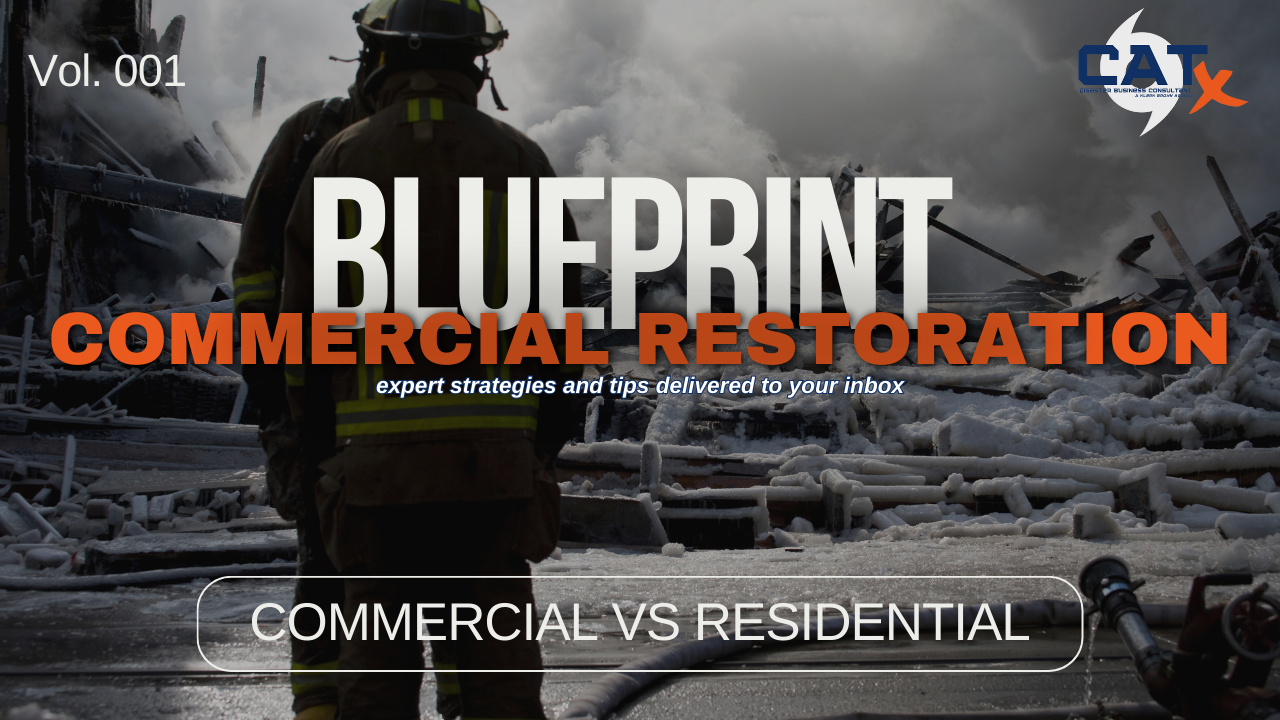
CATx Blueprint Vol. 001| How Commercial Is Managed Differently Than Residential
Mar 20, 2025When it comes to disaster restoration, both commercial and residential projects involve mitigation, remediation, and reconstruction. However, the way they are managed, executed, and billed is vastly different. Understanding these differences is crucial for restoration contractors looking to enter or scale their commercial division successfully.
You are invited to consume our YouTube version of this Blueprint here: https://youtu.be/oxFcJBaURbM
1. Stakeholder Complexity: More Decision-Makers
In residential restoration, you typically work with:
✅ The homeowner
✅ The insurance adjuster
Decisions in residential jobs are personal and emotional, with homeowners wanting their property restored quickly and with minimal disruption.
In contrast, commercial restoration involves multiple stakeholders, each with different priorities:
✅ Property managers or facility directors – overseeing day-to-day operations
✅ Business owners or corporate leadership – making financial decisions
✅ Insurance adjusters & consultants – reviewing scope and coverage
✅ Risk managers – ensuring compliance with business continuity plans
✅ Tenants and occupants – requiring minimal disruption during repairs
Key Difference: Managing a commercial loss requires coordinating multiple parties, balancing business needs with insurance restrictions, and ensuring operational requirements are met.
2. Business Continuity & Downtime Sensitivity
For homeowners, temporary displacement can often be accommodated through hotels or family stays. While they want their home back quickly, short delays are sometimes tolerable.
For commercial clients, time is money—downtime means lost revenue, displaced employees, and disrupted customers. Because of this:
🔹 Emergency response and immediate mitigation are crucial to minimizing downtime.
🔹 Restoration work is often performed after hours or in phases to keep businesses operational.
🔹 Some businesses require temporary solutions (climate control, temporary offices, modular structures) to continue operating.
Key Difference: Commercial restoration requires strategic planning to minimize business disruption and keep operations running.
3. Financial & Billing Differences
The payment structure for commercial projects differs significantly from residential:
💰 Residential Restoration:
- Homeowners rely on insurance payments (often ACV or RCV).
- Mortgage companies may be involved, holding funds in escrow.
- Payment cycles typically range from 30-60 days.
💰 Commercial Restoration:
- Businesses may self-fund the restoration if the loss is below deductible.
- Insurance claims are more complex, often involving third-party consultants or TPAs.
- Payment terms are longer (sometimes 60-120+ days), requiring strong cash flow management.
- Contracts and retainers are often required before work begins.
Key Difference: Commercial projects require more financial planning, contract negotiations, and the ability to handle extended payment cycles.
4. Scope of Work & Project Complexity
Commercial restoration jobs often have larger footprints, stricter codes, and more technical challenges, such as:
🔹 High-rise buildings and large-scale properties requiring specialized access and logistics.
🔹 HVAC, mechanical, and electrical systems needing expert remediation.
🔹 Code compliance & safety regulations (OSHA, ADA, industry-specific guidelines).
🔹 Multiple trades working simultaneously, requiring advanced coordination.
Key Difference: Unlike residential jobs, which are often more straightforward, commercial jobs require detailed project management, specialized labor, and compliance with strict regulations.
5. Insurance Negotiations & Carrier Interference
While both residential and commercial restoration projects involve insurance companies, commercial claims tend to be more complex, requiring advanced negotiation skills and strategic documentation.
🔹 Policy Interpretation: Commercial policies often contain business interruption clauses, co-insurance penalties, and coverage nuances that require a deep understanding.
🔹 Third-Party Influence: Carriers often bring in third-party consultants, TPAs, and forensic accountants to scrutinize claims and reduce payouts.
🔹 Longer Resolution Times: While residential claims may be settled within weeks, commercial claims can drag on for months, requiring persistence and expertise to secure fair compensation.
🔹 More Aggressive Cost Containment: Insurance carriers aggressively control commercial losses, making it critical to have strong contracts, proper documentation, and skilled negotiation tactics.
Key Difference: Without experience navigating complex commercial claims, restoration contractors risk underbidding, losing revenue, or failing to get paid in full.
Scaling Your Commercial Restoration Division with Confidence
If you’re serious about growing your commercial restoration division, you need more than just technical skills—you need a proven system to manage large-loss projects, negotiate effectively with insurance carriers, and ensure profitability.
That’s where CATx comes in.
With over 23 years of hands-on commercial and large-loss restoration experience, CATx provides battle-tested strategies, real-world insights, and step-by-step training to help you dominate in the commercial restoration space.
✅ Master commercial project management—from mobilization to final invoicing.
✅ Learn advanced insurance negotiation tactics to secure maximum payouts.
✅ Implement financial and cash flow strategies to sustain long billing cycles.
✅ Gain insider knowledge on dealing with TPAs, consultants, and carrier tactics.
📢 Ready to take your commercial restoration division to the next level?
🚀 Join CATx today and start winning larger, more profitable commercial jobs with confidence.
🔗 Click here to learn more about CATx
Want to attend our next live class/ workshop?
🔗 Click here to learn more about CATx
Stay connected with news and updates!
Join our mailing list to receive the latest news and updates from our team.
Don't worry, your information will not be shared.
We hate SPAM. We will never sell your information, for any reason.
